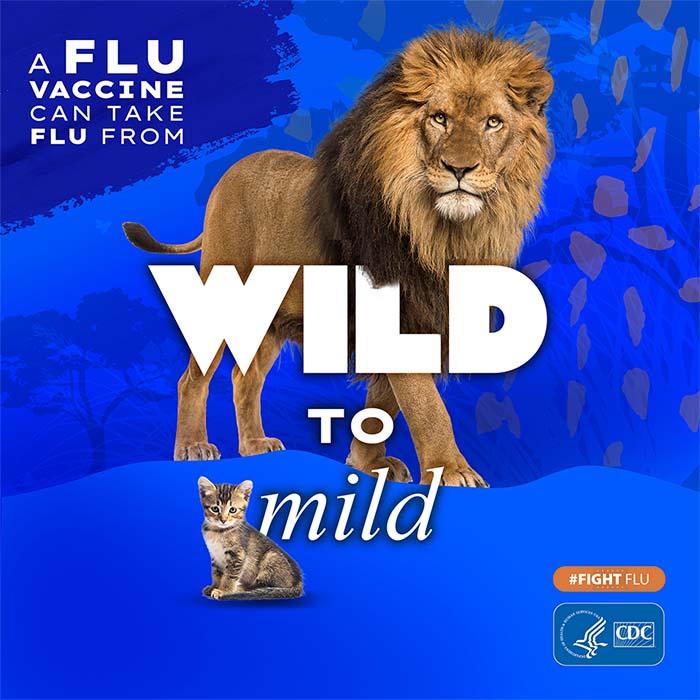Seasonal Influenza Vaccine Safety: A Summary for Clinicians
CDC and FDA monitor the safety of all vaccines licensed in the United States, including seasonal influenza vaccines. Studies support the safety of annual influenza vaccination in children and adults.
This summary provides information on four types of influenza vaccines:
- Egg-based inactivated influenza vaccine (egg-based IIV4s)
- Cell culture-based inactivated influenza vaccine (ccIIV4)
- Recombinant influenza vaccine (RIV4)
- Live attenuated influenza vaccine (LAIV4)
Three topic areas are reviewed for each vaccine type:
- Adverse Events: Symptoms or health problems that occur following or during administration of a vaccine that might be caused by the vaccine or might be coincidental and not related to vaccination.
- Contraindications: A condition in a vaccine recipient that increases the risk for a serious adverse reaction. A vaccine should not be administered when a contraindication is present.
- Precautions: A condition in a vaccine recipient that might increase the risk for a serious adverse reaction, might cause diagnostic confusion, or might compromise the ability of the vaccine to produce immunity. In general, administration of a vaccine should be deferred when a precaution to that vaccine is present. However, a health care provider may determine that vaccination is indicated in the presence of a precaution because the benefit of protection from the vaccine outweighs the risk for an adverse reaction.
Additionally, general vaccine safety information on the following topics appears at the end of this summary:
- Vaccination of persons with egg allergies
- National Vaccine Injury Compensation Program (VICP)
- Reporting adverse events to the Vaccine Adverse Event Reporting System (VAERS)
- Additional resources for clinicians
Egg-Based Inactivated Influenza Vaccines (Egg-Based IIV4s)
Egg-based IIV4s are administered by injection. These vaccines are made with influenza viruses that have been grown in eggs and contain very small residual amounts of egg proteins. The viruses are inactivated, and cannot cause influenza.
Cell Culture-based Inactivated Influenza Vaccine (ccIIV4)
Flucelvax Quadrivalent (cell culture-based quadrivalent inactivated influenza vaccine, ccIIV4) is approved for use in individuals 6 months of age and older. This vaccine contains influenza vaccines that have been grown in a cell culture instead of in eggs. These viruses have been inactivated and cannot cause influenza.
Recombinant Influenza Vaccine (RIV4)
RIV4 is administered as an injection. This vaccine is produced in an insect cell line using genetic sequences from cell-derived influenza viruses and is manufactured without the use of influenza viruses or eggs. This vaccine does not contain influenza viruses and cannot cause influenza.
Read more about how recombinant flu vaccines are made.
Live Attenuated Influenza Vaccine (LAIV4)
LAIV4 is administered intranasally. Rhinitis (runny nose) and nasal congestion occur more commonly after LAIV than IIV or placebo in adults and children.
- The most common adverse reactions to LAIV are runny nose or nasal congestion in all ages, fever >100°F in children 2-6 years of age, and sore throat in adults.
- One study of 8,352 children aged 6 through 59 months showed that younger children aged 6 through 23 months (an age group for which LAIV is not licensed) had increased rates of wheezing in the 42 days after LAIV (6%) than after IIV (4%). Children aged 24 through 59 months had similar rates of wheezing after LAIV (2%) and IIV (3%).
- According to the LAIV package insert:
- In children aged 2 through 6 years, fever >100° F occurred more often after first dose LAIV (16%) than placebo (11%). Adults receiving LAIV did not have an increased risk for fever after vaccination compared with placebo.
- In adults the following other adverse events were reported more often after LAIV than after an intranasal placebo: headache, sore throat, tiredness/weakness, muscles aches, cough, chills, and sinusitis.
Recommendations for Vaccination of Persons with Egg Allergy
People with egg allergy may receive any vaccine (egg-based or non-egg-based) that is otherwise appropriate for their age and health status. Previously, it was recommended that people with severe allergy to egg (those who have had any symptom other than hives with egg exposure) be vaccinated in an inpatient or outpatient medical setting. Beginning with the 2023-2024 season, additional safety measures are no longer recommended for influenza vaccination of egg-allergic persons beyond those recommended for receipt of any vaccine, regardless of the severity of previous reaction to egg. All vaccines should be administered in settings in which personnel and equipment needed for rapid recognition and treatment of allergic reactions are available.
Reporting Adverse Events
The National Childhood Vaccine Injury Act of 1986 requires health care providers to report any adverse event listed by the vaccine manufacturer as a contraindication to future doses of the vaccine or any adverse event listed in the VAERS Table of Reportable Events Following Vaccination (https://vaers.hhs.gov/docs/VAERS_Table_of_Reportable_Events_Following_Vaccination.pdf) that occurs within the specified period after vaccination. In addition, health care providers are encouraged to report all clinically significant adverse events after influenza vaccines and other vaccines to VAERS, even if it is uncertain that the vaccine caused the event. Anyone may submit a report to VAERS.
Anonymous VAERS data is publicly available through the CDC Wide-ranging Online Data for Epidemiologic Research (WONDER).
Additional information about VAERS and how to file a report is available on the VAERS website.
The National Vaccine Injury Compensation Program
The National Vaccine Injury Compensation Program (VICP) is a federal program that was created to compensate people who might have been injured by certain vaccines.
Individuals who believe they might have been injured by a vaccine can learn about the program and about filing a claim by calling 1-800-338-2382 or visiting the VICP website.
